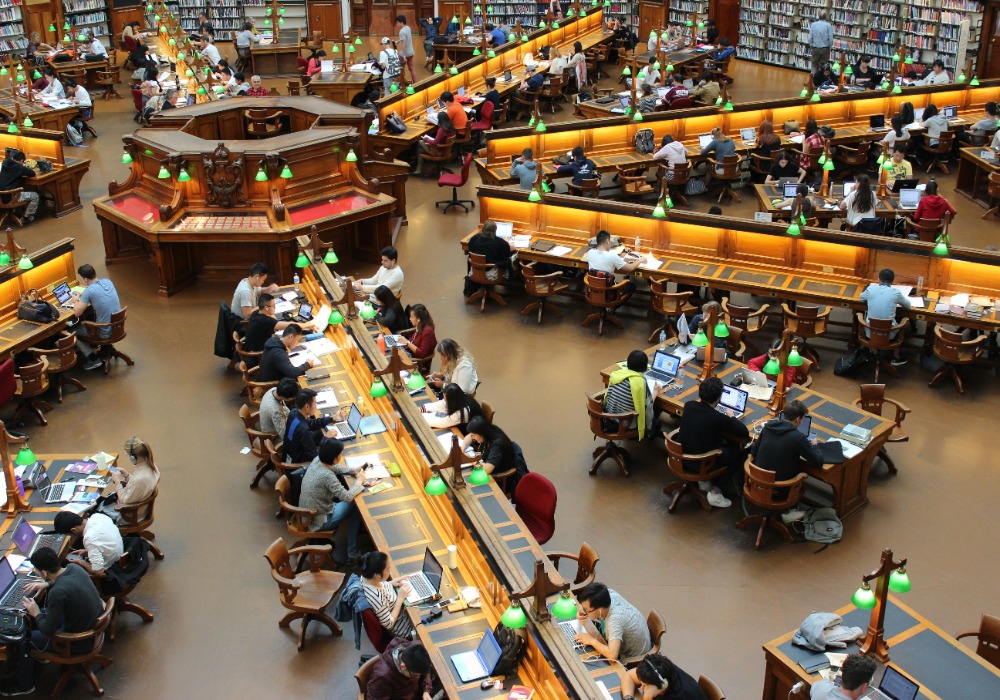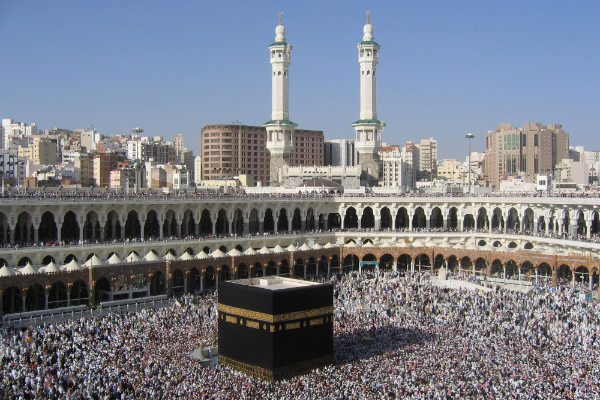Hazrat Musleh Maudra and his yearning for secular education.html


Ordinarily, religious leaders have nothing to do with the promotion of secular knowledge. In today’s world, Islamic leaders are not exactly champions of secular education.
However, in Islam, there is no difference between the spiritual sciences and the secular sciences; God created both and both are necessary for human beings. Both these sciences advance man together. The Holy Prophetsa described the same subject, saying that there are only two kinds of knowledge, knowledge of the body, and knowledge of religion.
In pursuit of such a goal, Allah the Almighty revealed to the Promised Messiahas that he would be bestowed a son who, “will be extremely intelligent and perceptive … and will be filled with secular and spiritual knowledge.” (Tadhkirah [English translation], p. 178 ed. 2018)
Therefore, just as Hazrat Musleh-e-Maudra blessed congregations with spiritual knowledge, he also tried his best to attract them towards secular knowledge.
The Promised Messiah’s contribution
The Promised Messiahas first sow this seed. He drew the attention of the Jamaat towards secular sciences. He categorically denied any contradiction between Islam and science. He was also an expert physician and his prayers and prescriptions healed thousands of people.
The foundation of Taleemul Islam College was laid on 28 May 1903. The Promised Messiahas prayed for it in Bait-ul-Dua. The Promised Messiahas had to mobilize separate donations for these purposes. Many elders of the Jamaat made special financial sacrifices for this purpose.
No child left behind
Consider the general educational condition of Muslims in those days. There were very few educated people among the Muslims. Whereas the West was advancing, the Muslims were in decline. Sir Syed Ahmad Khan, a contemporary of the Promised Messiahas, had tried to draw the attention of Muslims towards their education, but he had little success, dying tragically in 1898.
Ahmadis, on the other hand, were very few in their resources and numbers. Most of them belonged to poor families. In this climate, Hazrat Musleh-e-Maudra became the caliph on March 14, 1914. On April 12, barely a month after becoming the caliph, he convened a meeting of Ahmadi representatives from across the country. He declared, “I intend to preach in every nation and every language of the world.” He then stated, “There must not be any woman or man in the community who cannot read or write.” (Anwar-ul-Uloom Vol. 2 P. 49) Hazrat Musleh-e-Maudra made this plan part of the central plan of the Jamaat. When the Nazirat [departments] were formed in 1919, he also established an education department. Then when he set up auxiliary organizations, he included teaching illiterate people as part of an educational strategy of each organization. This scheme continues today.
Schools all over the subcontinent
He also demanded that schools be opened in various places. He said, "One madrassa (Taleemul Islam High School) which is open here is not enough. Apart from this school, there is a need to open madrassas in different places.” Then he said, "The believer does not lag in any matter, so we should not lag behind the Jamaat in matters of public education." (Anwar-ul-Uloom Vol. 2 P. 49)
The above instruction and scheme of Hazrat Musleh-e-Maudra became the basis of the rise in the general scientific education of the Jamaat.
According to the instructions of Hazrat Musleh-e-Maudra, many madrassas were opened in British India under very difficult circumstances. Religious education was also imparted and many virtuous generations were left with pure hearts and minds. Hazrat Musleh-e-Maudra said that since we are a Muslim community, each one of us must be educated. (Al Fazl Rabwah, 30 October 1945)
God blessed this initiative; there came a time when Jamaat Ahmadiyya was considered as the most educated community in Pakistan, and in the field of education, it is constantly advancing despite the conspiracies of its enemies even today.
Girl-child education
In this regard, Hazrat Musleh-e-Maudra paid special attention to women. The condition of women in India was worse than that of men. After becoming caliph in 1914, Hazrat Musleh-e-Maudra initiated projects for educating girls in 1915, and under his leadership, the community built a new girls' school in 1919. He established the women’s branch of Auxiliary organizations, Lajna Imaillah, in 1922 and education continued with great care. A Nusrat Girls School was also established in Qadian. When Rabwah was established, the first Nusrat Girls School was started in Rabwah in all educational institutions.
T. I. College
The T. I. College in Qadian was closed during the lifetime of the Promised Messiahas due to many difficulties. Hazrat Musleh-e-Maudra proposed a scheme of its revival at the very beginning of his caliphate. He said:
“We need to build our college to make the lives of our youth useful and efficient.” (Anwar-ul-Uloom Vol. 2 P. 51)
However, due to various difficulties, the work was delayed for 30 years. During the consultative meeting of 1943, Allah Almighty revealed to Hazrat Musleh-e-Maudra that he should open his college as soon as possible and then explained to him the benefits of this movement. (Al Fazl Rabwah, May 31, 1944, p. 5)
On 28 January 1944, Hazrat Musleh-e-Maudra announced that he was the fulfilment of the prophecy of the promised son, made by the Promised Messiahas in 1886. Therefore, in his Friday sermon of 24th March 1944, and in the Majlis-e-Mushaurat on 19th April 1944, Hazrat Musleh-e-Maudra initiated a scheme whereby a sum of Rs. 150,000, later Rs. 200,000, would go to funding the college.
In the first year, 60 students were admitted. Hazrat Musleh-e-Maudra appointed his son, Hazrat Mirza Nasir Ahmad Sahib (Khalifatul Masih III), as the principal, who held the post until his caliphate in 1965.
After the establishment of Pakistan in 1947, Hazrat Musleh-e-Maudra visited Lahore and on October 24, 1947, he instructed the administrators of the college to start a college wherever there was space on the land of Pakistan. So the college was started in December in a dilapidated building in Lahore.
After Rabwah was established, Hazrat Mirza Nasir Ahmadra Sahib worked hard day and night to build a college building in Rabwah and Hazrat Musleh-e-Maudra used to visit the college many times.
Taleemul Islam School and College has established excellent traditions of academic and practical training and character building.
African nations also benefited from the scheme of Hazrat Musleh-e-Maudra to establish educational institutions. Colleges are working and selflessly serving in these third-world nations. And in many countries, they have prominent roles in public education.
Scholarships
One of the most important initiatives of Hazrat Musleh-e-Maudra for the promotion of worldly knowledge was the introduction of educational scholarships. The student who would take the first position in middle school would get Rs. 12 per month until matriculation; the student who would take the first position in second matriculation would get Rs. 30 per month; the student who would take the first position in FA would get Rs. 45 per month; and the student who would take the first position in BA would get Rs. 60 per month for 3 years. After this examination, the student who would take the first position would be sent to England or America for education and Rs. 250 per month will be given for 3 years. (Anwar-ul-Uloom Vol. 15 P. 436)
In this regard, Dr Abdul Salam Sahib was also among the recipients of this scholarship, went to study in Europe with a government scholarship, set new milestones, and eventually won the Nobel prize, being the first citizen of Pakistan, and the first Muslim scientist, to do so.
After Dr Abdul Salam Sahib received the Nobel Prize, Hazrat Khalifatul Masih IIIrh announced prizes and scholarships at all levels. This award was given in Pakistan. Now, this award is distributed in all major countries.
Today, in the UK and Germany, Hazrat Khalifatul Masih Vaa, bestows awards every year at the annual convention. The Taleemul Islam Old Boys Association also provides financial support in this regard on the initiative of Hazrat Khalifatul Masih Vaa. In this regard, hundreds of thousands of rupees are provided every year for deserving students. It also issues loans to deserving students.
Hazrat Musleh Maudra started a movement in 1945 to make it possible for children to get at least a BA in any way possible. A very important scheme was devised to do this, the main point of which was that just as the community donated for other works, in the same way; some donations should be collected for it in every village so that these scholarships should be given to those who pass with high marks. This way, two or three students would get higher education in every village.
In this regard, Hazrat Musleh Maudra directed the President of Anjuman Ahmadiyya to provide one or two inspectors immediately for the supervision of education and training who will visit the whole of Punjab and the districts that meet other provinces with Punjab. Huzoorra pointed out that there were Ahmadis there and that they should be visited at the same time.
Thus, these inspectors went to every village and every city and made lists of how many boys there are in each class. They gathered data of their ages, the number of students who studied and those who did not study. Parents were encouraged to educate them. Efforts were made to get as many boys as possible to study in high schools and among the boys who pass out of high schools whose parents can afford it; they should be encouraged to send their children to study in Taleemul Islam College. (Al Fazl Rabwah 30 October 1945)
On the publication of this sermon, not only did the external parties send the required maps of data related to the expansion of education, but also two inspectors were provided with the approval of Hazrat Musleh Maudra to make this scheme fruitful as soon as possible. When the count was presented to Hazrat Musleh Maudra, he said: "At the same time, emphasis should be laid on education in those areas where those who are not getting an education should be forced to pursue education and those who are doing it should be forced to pursue higher education.” (Al Fazl Rabwah 5 June 1945)
Fazal-e-Umar & other projects
Hazrat Musleh Maudra also founded the Fazal-e-Umar Science Research Institute on 4th June 1944. There were several research institutes of this nature in India at that time. Thus it was the first Muslim research institute to come into existence in the subcontinent with the grace of Allah Almighty and the attention of Hazrat Fazl Umar.
Due to the severity of the situation in Pakistan, this institution had to be closed down. Similarly, to promote medicine, Hazrat Musleh Maudra also established a medical college in Rabwah, but the pressure of circumstances did not allow it to continue. The proposal of Ahmadiyya Medical College was also made many times in the consultative meetings of the time of Hazrat Musleh Maudra but its time had not come yet.
The lofty intentions of Hazrat Musleh Maudra
Hazrat Musleh Maudra says:
“When I sit in the train, I long to wish that this train was made by Ahmadis and that He is the owner of the company and when I sit in the plane I say I wish these planes were made by Ahmadis and he is the owner of these companies. After building the boat, they started sailing in the sea and fulfilled my longing and I could sit in it and say that this Ahmadi boat is floating in the open sea. Big things start with small things. These are mine. Intentions and these are my wishes.” (Report of the Consultative Council 1936, p. 129)
Today, it is our duty to carry this zeal that Hazrat Musleh Maudra left us with. May Allah enable us to do so.
Jazib Mehmood, Jamia Ahmadiyya International Ghana

Feel free to explore our collection and choose the next article that piques your interest!